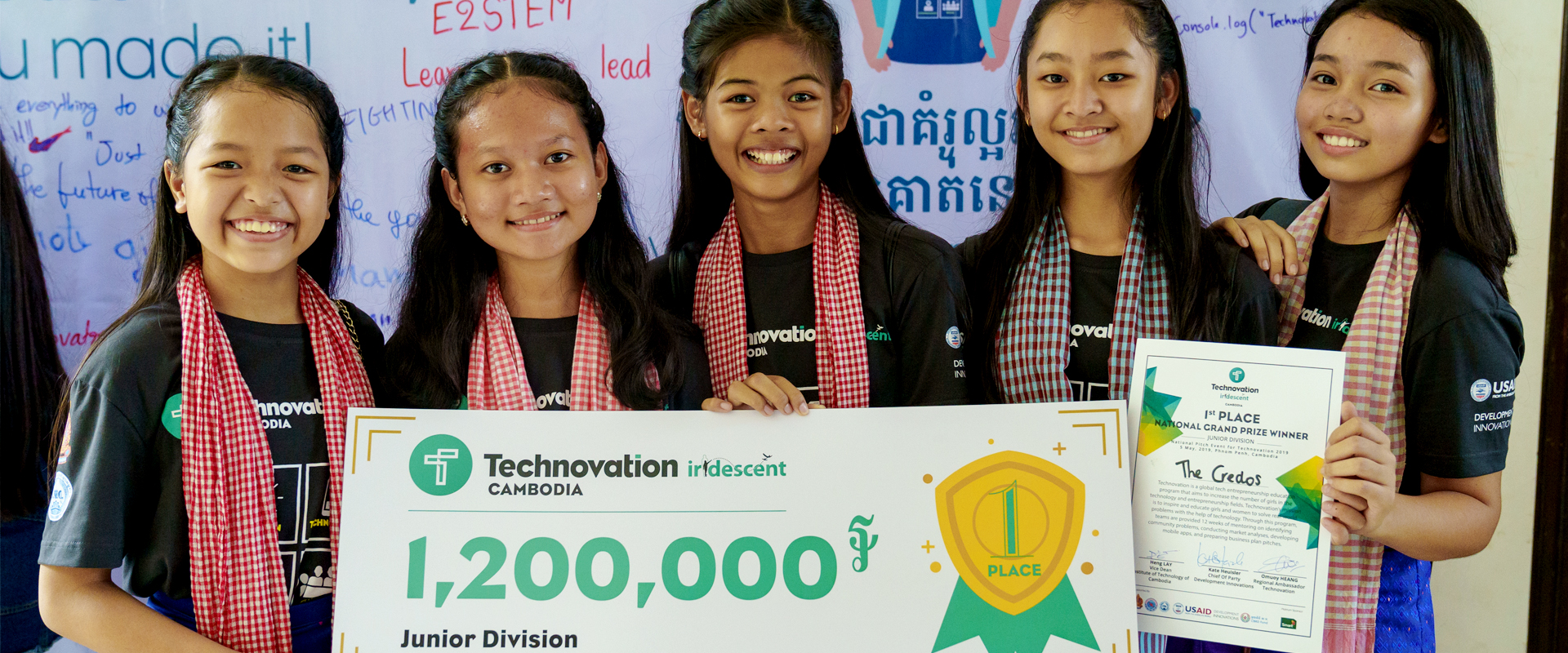Students at Liger Leadership Academy are involved in projects linked to ‘real life’ experiences and are already becoming empathetic leaders having a positive impact. Many of our projects incorporate to the United Nations Sustainable Development Goals.
Through continuous assessment, we clearly see how Cambodian communities are impacted and how each student is progressing in acquiring the tools with which to create positive, enduring change in their country as globally aware citizens who are deeply rooted in local culture. Liger students are not only succeeding in becoming self-sufficient, but they are working on projects to make other Cambodians more self-sufficient as well.
Liger Marine Research Team
On tiny Koh Seh island, off the coast of Cambodia, a group of passionate marine conservationists protect the oceans from illegal fishing and work to reintroduce marine biodiversity to the region. These conservationists are changing the Cambodian coastline…and haven’t even graduated high school – they are the Liger Marine Research Team (LMRT).
LMRT is a group of eight of Liger students who are undertaking a three-year project in conjunction with the non-profit Marine Conservation Cambodia (MCC). Our students collaborate with MCC to deploy artificial reefs off the coast of Cambodia to encourage biodiversity back to the region. The results of the project can already be visibly seen and are being recorded. The team is continually presenting its findings to marine conservation groups, government officials, fishing communities and public schools to educate them about the Cambodian marine ecosystem.
Cambodia was devastated during the reign of the Khmer Rouge, destroying ecosystems, social structure, academia and any forward movement with the rest of the world. Without regulations, enforcement or education coupled with a great need of fish (protein), the Cambodian marine ecosystems have been overfished. But through the work of LMRT and MCC, Cambodia’s oceans have a fighting chance.

Gender Summit
At Liger, we don’t shy away from difficult or controversial subjects. In fact, we believe that to change Cambodia, these discussions are essential. In Cambodian culture, conversations about gender inequalities and traditional gender roles can feel uncomfortable and are often avoided within the family and school environments; in order to facilitate the necessary dialogue for empowerment and change, Liger students examined gender discrimination and inequalities in Cambodia during a seven-week Exploration, culminating in the Liger Gender Summit.
Over 100 students from across Cambodia visited the Liger campus for the student-organized Summit and took part in workshops and discussion groups on culture, language, balance of power and portrayal of gender in society. Upon returning to their communities, these newly empowered students disseminated their new knowledge to their peers expanding the reach of the Gender Summit far beyond Liger’s walls.
After the Summit, Liger students used their research from the exploration and experiences with their peers to produce a blog on gender equity in Cambodia which included essays on gender topics studied, opinion pieces, and a documentary that students created during the Gender Summit. With a new generation of young people facilitating discussion and encouraging positive change on social issues like gender equity, the future of Cambodia is in good hands.

Solar Pi
The Solar Pi project is a multi-year student exploration and collaboration with the Ministry of Education, Youth and Sport (MoEYS) to develop low power consumption, solar- or grid-powered computer labs for government schools in Cambodia. Designed to address the MoEYS’s desire to introduce STEM education into government schools, the Liger Solar Pi program has installed two computer labs to date – one solar, and one powered on-grid, giving rural Cambodian students access to computer programs and training they would not have had otherwise.
Since 2016, Liger students have been working on the development and promotion of STEM curriculum through this exploration. They built custom enclosures for Raspberry Pi computers, then created education materials and training programs and provided existing software through a partnership with the established education company Edemy.
255 students have already benefited from classes in the first two proof-of-concept computer labs – one in outer Phnom Penh and one in a rural area of Takeo Province – with the latter opened by the Secretary of State for Education. The project is being developed as a replicable package with the long term hope that all students in public schools across Cambodia will have the resources available to develop skills in spoken and written English and in STEM fields.
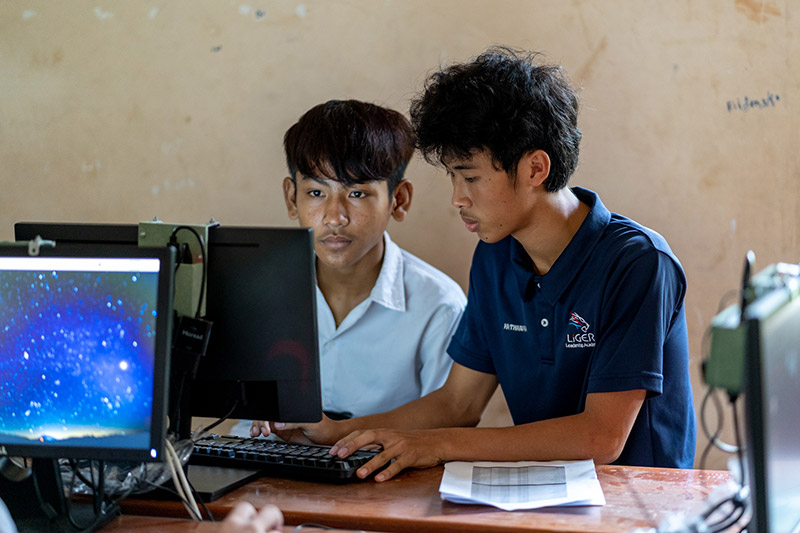
Economy Book
When Liger students realized there was limited information about the Cambodian economy, in particular for Cambodian students and laypeople, they decided to undertake the daunting task of creating an economy reference book from scratch. By the end of the project, these students were published authors with a book sold in bookstores and distributed to schools across Cambodia at the request of the Minister of Education.
A group of ten Liger students (aged 12 and 13) collaborated to produce a professional, yet readable, volume outlining detailed information covering six primary sectors of the Cambodian economy. The students researched the book independently and were responsible for all supporting information, photographs and infographics. Working with local educators and global digital mentors, the students then wrote and published the book in side-by-side English and Khmer (Cambodian) languages.
The book was very well received. Not only is it carried in top tier commercial bookstores in Cambodia, but the Minister of Education was so impressed that he both wrote the book’s introduction personally and directed it to be distributed to 500 Cambodian schools nationwide. Based on this success and the ongoing evolution of the Cambodian economy, a new group of Liger students is working on Volume Two.
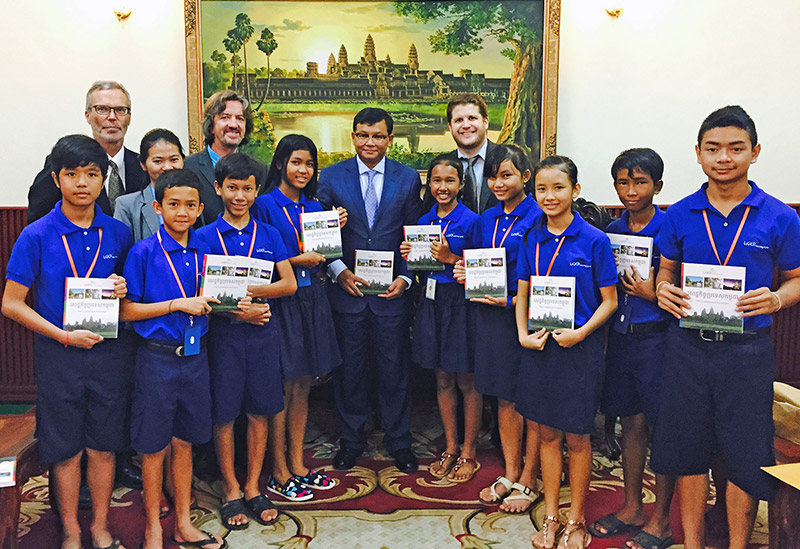
Journeys of Change
With one of the fastest growing economies in Asia, Cambodia is brimming with potential. There is a real need for strong, ethical businesses which can only be built by passionate, forward-thinking entrepreneurs. Our students are already there with 100% of the student body having participated in real or simulated business startups. One of the most successful student businesses is Journeys of Change – a fully operational bicycle tour business.
Journeys of Change started as many successful projects do. Our students identified a problem – a lack of opportunities to experience local culture in a rural setting – and decided to solve it. After a term of examining the viability of a bike tour business, the students created Journeys of Change. The student-operated tour examines the changing landscape of Cambodia while simultaneously supporting local businesses, being environmentally conscious, training tour guides in responsible tourism and providing cross-cultural exchanges.
Created by our students as part of their project-based learning curriculum, Journeys of Change has now taken on a life of its own as a fully-fledged business. Operated by students – with guidance from staff – it currently employs students as business managers, marketing managers, and tour guides. The Journeys of Change team is now expanding the business to include other tours, including a walking market tour in central Phnom Penh. Revenue earned from the business is used to help students fund their education after graduation.
To learn more about this business, we invite you to read the article on Journeys of Change published in the Sydney Morning Herald.
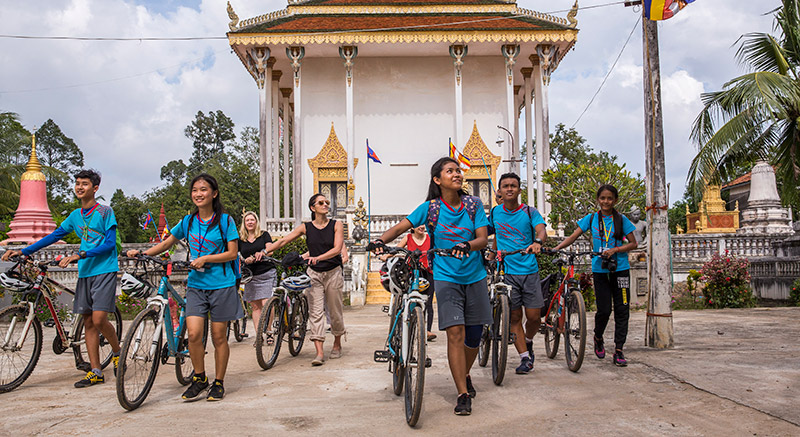
Technovation
The Technovation Challenge is a global competition that offers girls around the world the opportunity to learn the skills they need to emerge as tech entrepreneurs and leaders. With 95% of female Liger students having competed in a global coding competition, the Technovation Challenge is always very popular on the Liger campus.
As part of the Challenge, every year girls aged 10 to 18 are asked to identify a problem in their community, create a mobile app solution to address that problem and learn how to communicate these ideas and translate them into a fully launched business. Teams are supported by mentors and guided by the Technovation curriculum.
In 2017, having just 12 weeks of coding and business training under their belts, five Liger juniors girls (ages 12 and 13) conceptualized, designed, and mocked up an app called the “Cambodia Identity Project”. The app worked to improve the livelihoods of rural Cambodian communities by connecting Cambodian artisans in the country with vendors in the city. Competing against 1,100 teams worldwide, the Liger team was one of twelve teams selected for the final round of the Technovation Challenge in Silicon Valley and was awarded $5,000 to forward their learning in STEM.
In 2018, Liger saw success once more in the Technovation Challenge, with students winning the national competition in the Junior Division with their app M.E.P, which solved the challenge of finding quality mechanical, engineering or plumbing contractors in Cambodia by providing a platform where services could be requested or offered, and completed jobs rated by the customer.
In 2019, Liger junior students had their best results yet – placing second out of 7,200 girls from 57 countries. Their app “Naeng-Norng” is dedicated to preserving Khmer poetry which is at risk of being forgotten due to its massive loss during the Khmer Rouge genocide. Liger students were awarded $5,000 at the Technovation global finals in Silicon Valley.
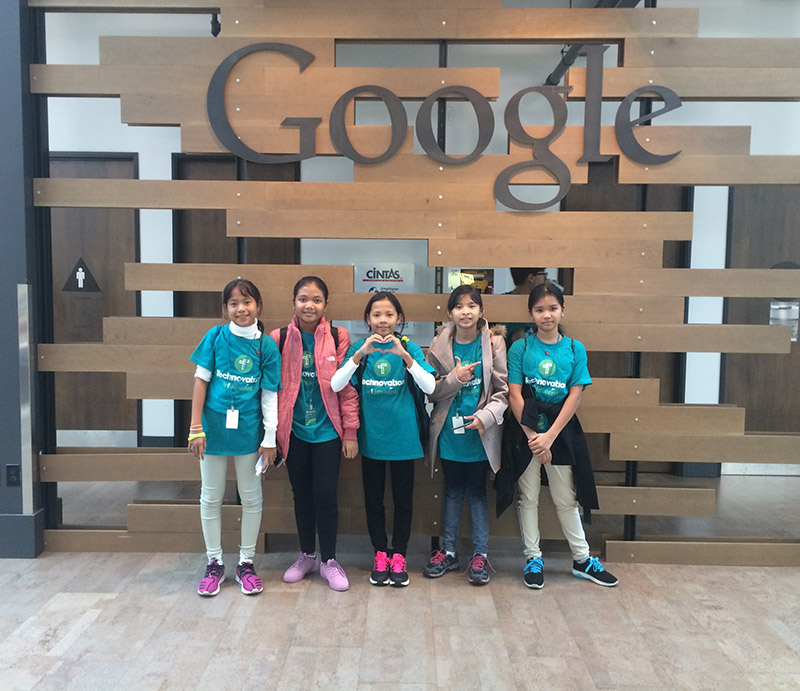
Digital Currency
In an era where Bitcoin is a household name, it’s no surprise that our tech-savvy students have created a digital currency. As part of Liger’s STEM studies, our students designed and implemented a system for transferring currency digitally between students and staff. While building their programming skills, students were challenged to view the project as a system of many interconnected parts.
During the exploration, Liger students learned the technical aspects of User Experience/User Interface, Database, and Communications as well as coding skills including AppScript, Javascript and/or HTML and CSS.
The resulting digital currency – named the “Pedro” – is not just a learning experience to be shelved and forgotten about. Pedros are now a core part of life at Liger and have been in use on campus since late 2016. As our senior students live relatively independently in shared apartments, Pedros are allotted to the students to be used to purchase groceries, kitchen supplies, personal care items, and pay utility and maintenance bills. The Pedro demonstrate the strength of Liger’s unique program – students using new knowledge to solve a real-world problem.
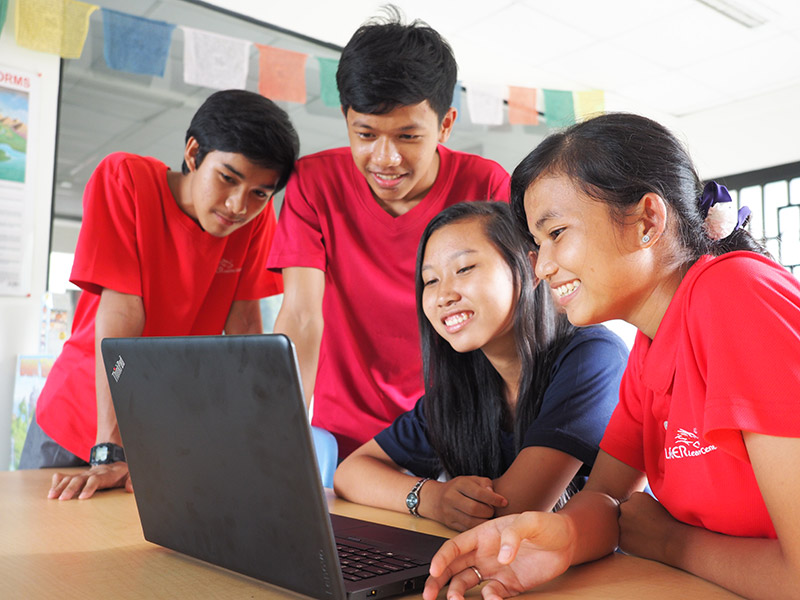
Business Model Competition
At Liger, students are taught that age is not a barrier to success, so it was not surprising when Liger students were the first high school team ever admitted into the Business Model Competition (BMC) and walked away with astonishing results.
The BMC is a Cambodian business model development competition for university and graduate students. In 2018, Liger received special permission to become the first high school in the history of the competition. Out of 111 teams, our Liger students came in third place!
In 2019, Liger returned to the BMC with two teams of students competing against 68 other teams with their business ideas: UNi, an app that enables job-seekers to showcase themselves in the international job market in a more innovative and complete way by focusing on talents, hobbies, and experiences in addition to work history, and Chek Rom Lek, an app that provides a repository for student resources in the Khmer language – an innovation that is sorely needed in Cambodia where students are disadvantaged when only second-language resources are available. Both teams reached the top ten and UNi was awarded first place! The winning Liger team received $5,000 to develop its business and gained entry to the Asia-regional competition – the Mekong Challenge.
The Mekong Challenge pitted our Liger team against even tougher competition – business challenge winners from across South East Asia including a mix of university and graduate students from internationally acclaimed universities as well as young and established professionals. Our Liger students held their own and placed third while competing against people twice their age. With an injection of $5,000 to develop their business, the dedication and hard work of our Liger students, and with commercial interest already expressed, this is only the beginning for the UNi team.
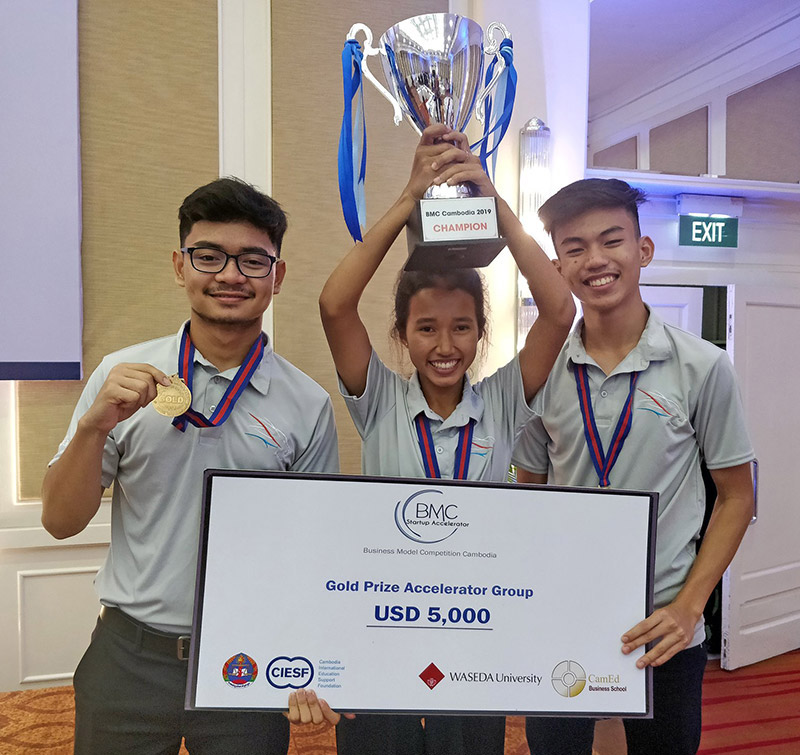
Bambujaya
Liger’s project-based learning curriculum asks students to identify real world problems and find solutions to those problems… but sometimes the real world problems find them.
Bambujaya Bilingual School is an innovative, privately-owned school in Cambodia that aims to teach the government curriculum in a more dynamic, activity-based manner. Created as an alternative to public school, where students often struggle to learn from rigid learning methods and large class sizes, Bambujaya needed assistance engaging its students with the government curriculum.
Liger students were hired as consultants by the founder and funder of Bambujaya to create supplemental activities for the Khmer Grades 1,2 and 3 curriculum. Liger students studied within Cambodia’s public school system prior to Liger, so they were in an ideal position to see differences from – and potential enhancement to – the government curriculum.
Bambujaya officially opened in late 2018 and Director Noreen Crowley is excited about future possibilities: “Looking at what the Liger students created made me realize that our partnership with Liger could be much deeper in the future. We are so closely aligned and have the same goal – to open Cambodian children to the possibilities that life holds and to show them the beauty in life and how they can contribute to it. We hope to bring on Liger students as interns so that they can continue this project hands-on, on the ground, with our students.”
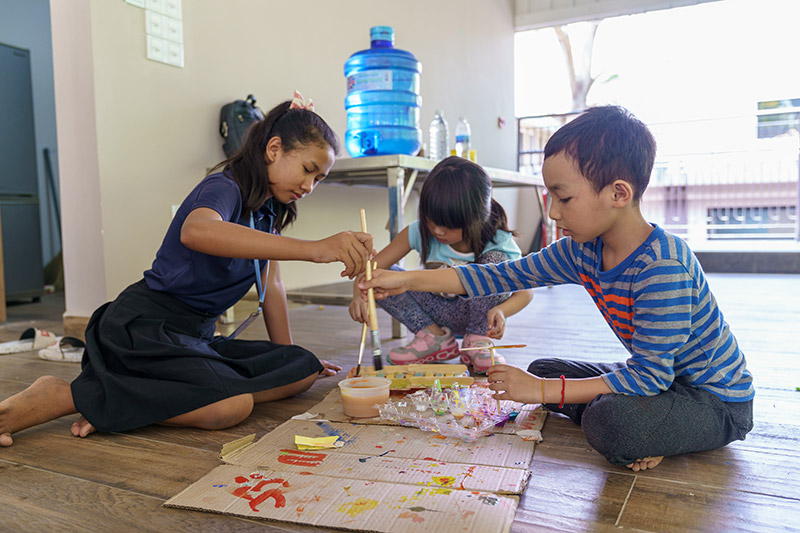
Khmer Rouge Genocide
Between 1975 and 1979, 1.5 million Cambodians died of execution, starvation, disease or overwork as part of Khmer leader Pol Pot’s efforts to create an agrarian socialist society. The effects of the Cambodian genocide went beyond the loss of life as the country’s educated class and infrastructure were destroyed. Over the course of the academic year, Liger students studied the genocide in four different ways to gain a better understanding of the genocide and examining how it shaped their country.
Students visited the mass graves at the Killing Fields, the S-21 Genocide Museum, and the Anlong Veng Peace Center and interviewed genocide survivors. Students produced a variety of projects examining the genocide in different ways including:
- 3D printed maps showing the decrease in Cambodian land mass since the 12th century
- Two hand-painted wonder walls asking questions compiled by students throughout their study
- A “sensory experience” with students dressed in pre-Khmer Rouge clothing, bamboo furniture, and traditional musical instruments
- Hand-painted maps of killing fields in Cambodia with photos and captions detailing life before the Khmer Rouge
- An original play showing the vast difference between life for teenagers during the Khmer Rouge and life for Cambodian teenagers today
- Documentaries about the group’s trip to S-21 and Anlong Veng Peace Center
- Original poems and songs, in Khmer and English, hand-painted onto fabric
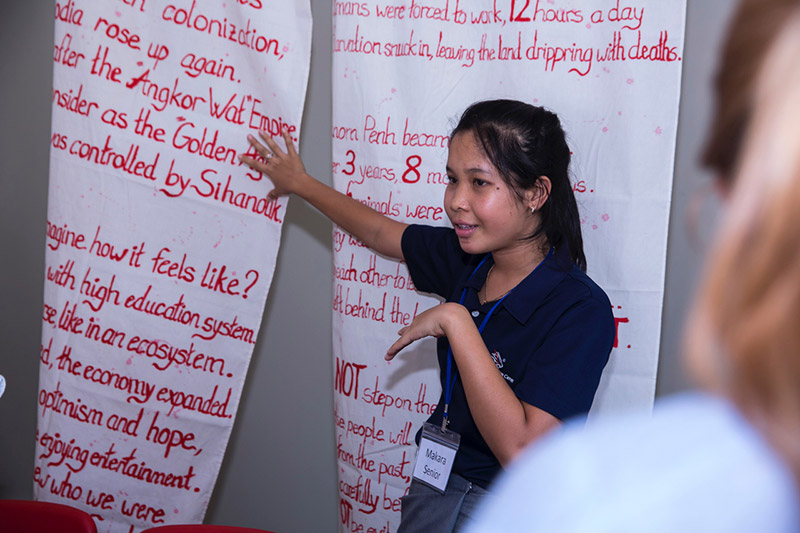
Water Safety
According to a UNICEF report, it is estimated that six children die from drowning every day in Cambodia. Approximately 90% of all Liger students were non swimmers when they arrived on campus. Therefore with these statistics, it was critical that our students learned to swim and be safe around water. After developing their own swimming skills the LLA students felt it imperative to share this knowledge. They researched, developed and delivered an ad campaign to children in the provinces and also, developed and delivered water safety and swim lessons for young Cambodians from LLA surrounding communities.
The students also advanced their own swimming skills to the point where 6 to 10 students compete in the Mekong River Swim annually. The event is an open water 800m swim in strong currents, drawing participants of all ages from around the world. Some highlights from those swims include being the youngest ever swimmers to compete and placing 3rd in the overall team event.
Click here to read the UNICEF report.
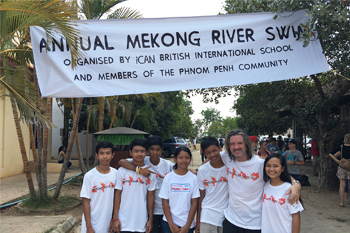
The Illustrated Guide To Wildlife of Cambodia
LLA worked in collaboration with a New York based non-profit organization “Art in a Box” to create a book on Cambodian Wildlife, depicting some 87 different Cambodian species and 7 ecosystems. Liger students worked with a wide variety of experts ranging from a New York artist, who mentored them in creating original watercolors for almost 100 animal species, to scientists worldwide adding expertise about the animals, to mentors working to publish the book in both Khmer (Cambodian language) and English. Students then worked on crowdfunding, designing and selling merchandise and other fundraising techniques to print enough books to distribute to government schools throughout Cambodia at the behest of the Minister for Education. The book is believed to be the first of its kind and is available for sale in prominent bookstores in Cambodia.
As a result of the publication of this book, our students were featured as experts on national television and a documentary providing potential solutions for Green Cities, forests and animals, pollution/new energies, and changing education and behavior.
Click here to see the successful crowdfunding campaign for this book.


